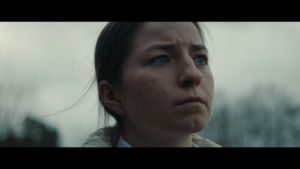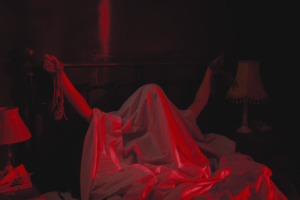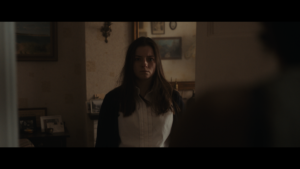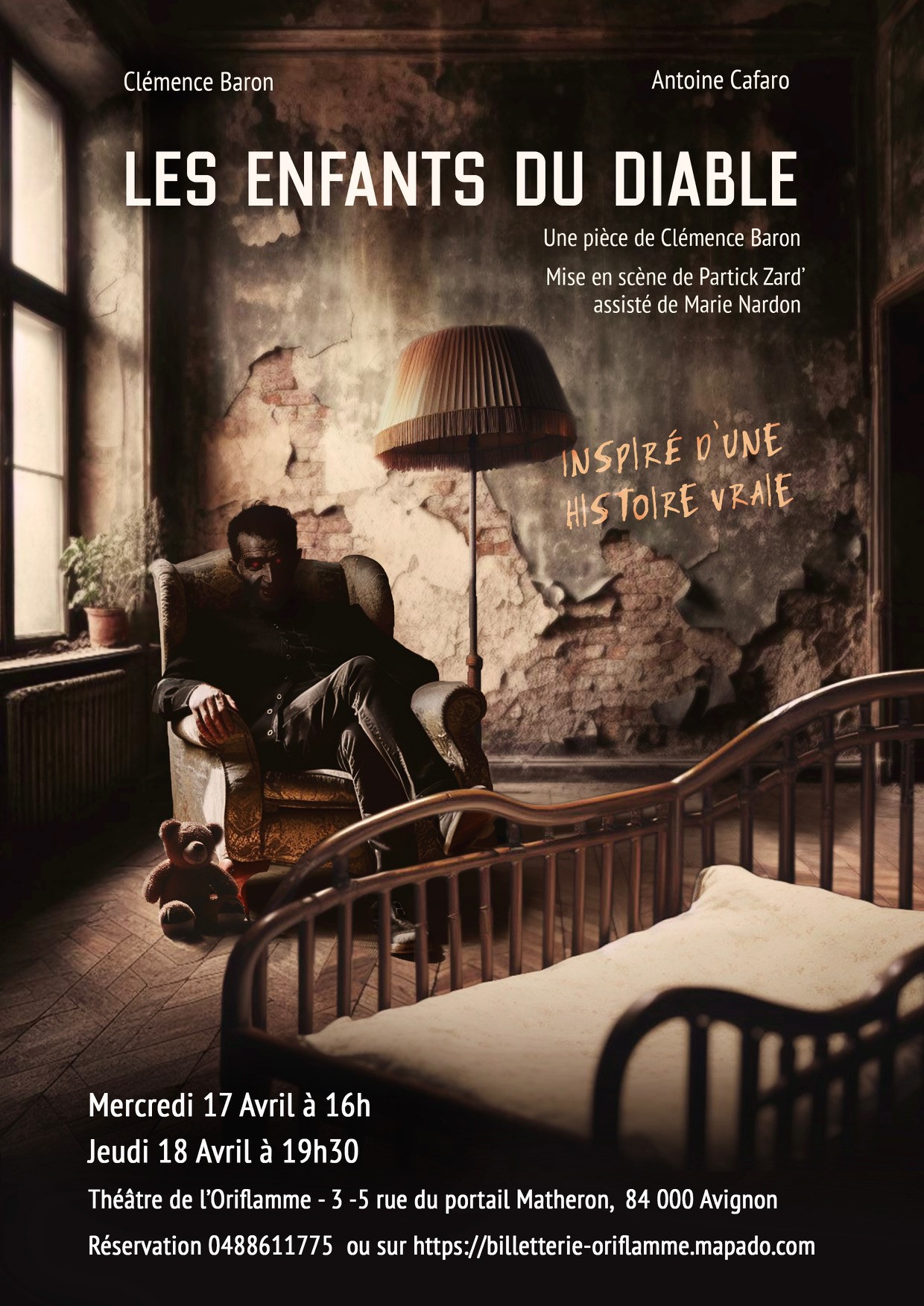On the occasion of the release of her first feature film Samhain – the origins of Halloween, we spoke with director Kate Dolan about her film that reworks the limits of her genre, against the backdrop of the heritage of Irish folklore, as well as the family, its dramas and secrets. A religious festival with Celtic origins, Samhain marks the transition from summer to winter, whose celebration reaches its peakon November 1 , echoing our Halloween party. But far from the mediocre ghost costumes and innocent candy spins, Samhain tells us the story of Charlotte, a young teenager living in the Irish suburbs with her grandmother and mother, Rita and Angela Delaney. The latter, struggling with depression, radically changes her attitude after disappearing for a full day without any explanation. But as Charlotte wonders about this sudden change, her mother's behavior becomes increasingly worrisome.  For this first feature film, Samhain (You're not my mother of its original title) is intended to be a horror film with the appearance of a psychological thriller and coming-of-age movie. "That was the whole point of the film, to stay in the horror frame and bring all these elements without getting lost. It was quite tricky [laughs].And despite the horrific atmosphere of the film, it is this controlled mix of genres that makes it all the charm. Thus, the gloomy and comforting landscapes of Ireland serve as a backdrop for Charlotte's destiny, witnesses of her loneliness and her complicated relationships with her comrades, but especially the dismantling of her family. Perceived as the strange family of the neighbourhood, the film depicts the place that mental illness takes in Charlotte's home, and its impact on the bonds between its members. "When you're young and your family is dealing with mental illness, it's hard to live your life without being affected by it, so you're building on that foundation a little bit in spite of yourself. Personally, life at home was far from perfect, and in a way, I tried to create my own little family outside of the domestic setting.The challenge is all the more complicated for Charlotte who, having grown up in a very assertive spiritual setting, is imbued with these myths and legends that seem to shape her destiny, but whose beliefs are sorely tested.Even as her folkoric heritage tends to impose itself, Charlotte will see her certainties shaken up ("I don't really know what to believe anymore"), despite the predominance emanating from the matriarchal framework. "The three generations of women in the film are a metaphor for Irish society. It is a complex combination of grandmother's magical thinking and belief in other worlds, against the backdrop of the influence of Catholicism. I also wanted these women to represent our relationship to trauma. The grandmother is in a state of mind where we should not talk about painful things and secrets. The mother, on the other hand, is more of the type to say "I don't think I'm able to bear the weight of all this". Whereas Charlotte, who is quite close to my generation, is rather willing to bring out the secrets of the darkness and face what has been swept under the carpet.
For this first feature film, Samhain (You're not my mother of its original title) is intended to be a horror film with the appearance of a psychological thriller and coming-of-age movie. "That was the whole point of the film, to stay in the horror frame and bring all these elements without getting lost. It was quite tricky [laughs].And despite the horrific atmosphere of the film, it is this controlled mix of genres that makes it all the charm. Thus, the gloomy and comforting landscapes of Ireland serve as a backdrop for Charlotte's destiny, witnesses of her loneliness and her complicated relationships with her comrades, but especially the dismantling of her family. Perceived as the strange family of the neighbourhood, the film depicts the place that mental illness takes in Charlotte's home, and its impact on the bonds between its members. "When you're young and your family is dealing with mental illness, it's hard to live your life without being affected by it, so you're building on that foundation a little bit in spite of yourself. Personally, life at home was far from perfect, and in a way, I tried to create my own little family outside of the domestic setting.The challenge is all the more complicated for Charlotte who, having grown up in a very assertive spiritual setting, is imbued with these myths and legends that seem to shape her destiny, but whose beliefs are sorely tested.Even as her folkoric heritage tends to impose itself, Charlotte will see her certainties shaken up ("I don't really know what to believe anymore"), despite the predominance emanating from the matriarchal framework. "The three generations of women in the film are a metaphor for Irish society. It is a complex combination of grandmother's magical thinking and belief in other worlds, against the backdrop of the influence of Catholicism. I also wanted these women to represent our relationship to trauma. The grandmother is in a state of mind where we should not talk about painful things and secrets. The mother, on the other hand, is more of the type to say "I don't think I'm able to bear the weight of all this". Whereas Charlotte, who is quite close to my generation, is rather willing to bring out the secrets of the darkness and face what has been swept under the carpet. In a party setting where the monsters are out, Samhain tells the story of Charlotte and her family's struggle against their own demons. And although she is warned against demonic creatures that must be protected at all costs, her mother quickly embodies the darkness she must fight against, even if it involves heavy sacrifices. "For me, Angela's death is a way for her daughter to free herself from her trauma. The bonfire embodies his ultimate decision: let this darkness consume her, or start all over again. For Charlotte, it's a way of telling her mother that she wants to lead a different life than hers, knowing that they must remain vigilant and protect themselves from monsters.In addition, it is necessary to kill the mother to free oneself from her shadow.
In a party setting where the monsters are out, Samhain tells the story of Charlotte and her family's struggle against their own demons. And although she is warned against demonic creatures that must be protected at all costs, her mother quickly embodies the darkness she must fight against, even if it involves heavy sacrifices. "For me, Angela's death is a way for her daughter to free herself from her trauma. The bonfire embodies his ultimate decision: let this darkness consume her, or start all over again. For Charlotte, it's a way of telling her mother that she wants to lead a different life than hers, knowing that they must remain vigilant and protect themselves from monsters.In addition, it is necessary to kill the mother to free oneself from her shadow.  Finally, Samhain appears to us as a tale about the quest for identity and how to (re)build oneself after a tragedy. Like two concurrent phenomena, Angela sees her body and mind transform as her daughter evolves. "When you're struggling with mental illness, you almost have to hit rock bottom to go back up, and you see it with the mother and her past which is the most destructive of this family. In a way, it's like she needs to go through self-destruction to rise from the ashes [laughs].On the other side of the mirror, if Charlotte has trouble knowing who she really is, she manages to find herself by taking the risk of losing her mother forever, and this in the name of her own freedom. "I think that's the very purpose of adolescence, to be able to build a solid healthy foundation. Even if you try to reinvent yourself outside of your family, you can never really detach yourself from it, the only way being to embrace this truth and learn to live with it.Samhain – the origins of Halloween (You're Not My Mother) is to be discovered today in cinemas.
Finally, Samhain appears to us as a tale about the quest for identity and how to (re)build oneself after a tragedy. Like two concurrent phenomena, Angela sees her body and mind transform as her daughter evolves. "When you're struggling with mental illness, you almost have to hit rock bottom to go back up, and you see it with the mother and her past which is the most destructive of this family. In a way, it's like she needs to go through self-destruction to rise from the ashes [laughs].On the other side of the mirror, if Charlotte has trouble knowing who she really is, she manages to find herself by taking the risk of losing her mother forever, and this in the name of her own freedom. "I think that's the very purpose of adolescence, to be able to build a solid healthy foundation. Even if you try to reinvent yourself outside of your family, you can never really detach yourself from it, the only way being to embrace this truth and learn to live with it.Samhain – the origins of Halloween (You're Not My Mother) is to be discovered today in cinemas.







































